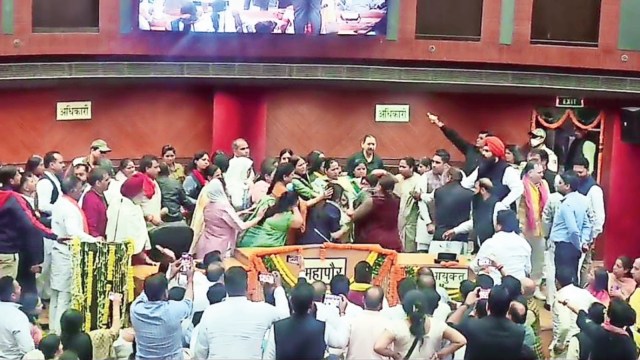MCD passes Rs 16,000-crore budget this FY amid chaos
The House session witnessed disruptions from the opposition BJP councillors, with Mayor Shelly Oberoi passing the budget in the absence of MCD Commissioner Gyanesh Bharti.
 "Today, we passed the budget amidst the ruckus created by BJP councillors... Our biggest achievement is that there has been no change in the budget presented by the MCD Commissioner," said Oberoi.
"Today, we passed the budget amidst the ruckus created by BJP councillors... Our biggest achievement is that there has been no change in the budget presented by the MCD Commissioner," said Oberoi.
The Municipal Corporation of Delhi (MCD) passed its budget for the financial year 2024-25, totaling Rs 16,000 crore, amidst chaos during its second presentation on Thursday.
The House session witnessed disruptions from the opposition BJP councillors, with Mayor Shelly Oberoi passing the budget in the absence of MCD Commissioner Gyanesh Bharti.
In the previous financial year 2022-23, the corporation had recorded an income of Rs 9,506.58 crore. For the upcoming fiscal year, the corporation anticipates an increase in the tax collection, aided by geo-tagging of properties, with an aim to hit a Rs 2,000-crore boost. Additionally, revenue from property tax, car parking, advertisements, and trade licensing is also expected to rise significantly.
Meanwhile, claiming that the budget was passed through an “illegal passage” in the absence of the Commissioner, a Delhi BJP delegation submitted a memorandum to Lieutenant Governor V K Saxena.
The Delhi government’s contribution to the MCD for teachers’ salaries is set to increase to Rs 1,500 crore — reflecting a slight uptick from the previous year. The health department’s budget has also seen an increase, focusing on improving MCD hospitals to align with the Delhi government standards.
A substantial allocation is earmarked for sanitation in the upcoming fiscal year, with an aim to tackle long-standing garbage issues. Efforts include the deployment of vacuum-based battery-operated cleaning machines as well as plans for waste management. Furthermore, initiatives to improve air quality through the promotion of e-vehicles and charging stations are also on the agenda. There are provisions for road improvement projects worth Rs 1,000 crore, along with a 100-time increase in the Mayor’s discretionary. Additionally, Rs 15 crore was allocated for the maintenance and construction of gau sadans for the welfare of cows.
To enhance transparency, the MCD plans transition from a single-entry accounting system to a double-entry one, along with efforts to digitise all transactions. Special provisions for repairing corporation buildings and addressing road safety concerns, including dark spots, have also been outlined. The corporation aims to incentivise the councilor’s attendance with a proposed allowance of Rs 25,000 per House meeting, while allocating Rs 10 crore for the purpose.
The MCD also plans doorstep delivery of government services and revenue-generating measures such as renting school playgrounds and auctioning illegal parking sites. Utilisation of AI for maintaining roads, monitoring garbage, and managing parking areas are part of the budgetary initiatives. These include using AI for prompt road cleaning and equipping parking spaces with FASTags, and a new parking app for pre-booking slots.
“Today, we passed the budget amidst the ruckus created by BJP councillors… Our biggest achievement is that there has been no change in the budget presented by the MCD Commissioner,” said Oberoi.
The initial proposal for the budget was put forth by the Commissioner during the Special Budget Meeting of the House on December 8 last year. The budget presentation was labeled as the “Commissioner’s and officers’ budget”; and in response, leaders of the AAP-led MCD had pledged to conduct over 200 meetings to gather public opinions and input for the final budget.








